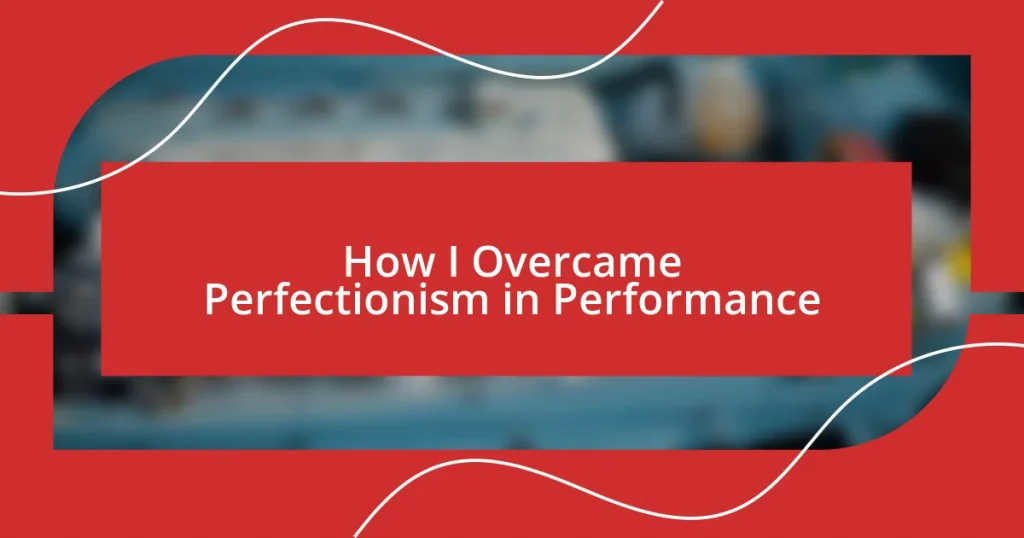Key takeaways:
- Perfectionism is driven by fear of judgment and failure, leading to unnecessary stress and self-doubt.
- Identifying personal triggers and setting realistic, flexible goals fosters healthier attitudes towards performance and reduces anxiety.
- Celebrating small wins and implementing self-compassion strategies help shift the focus from perfection to progress and personal growth.
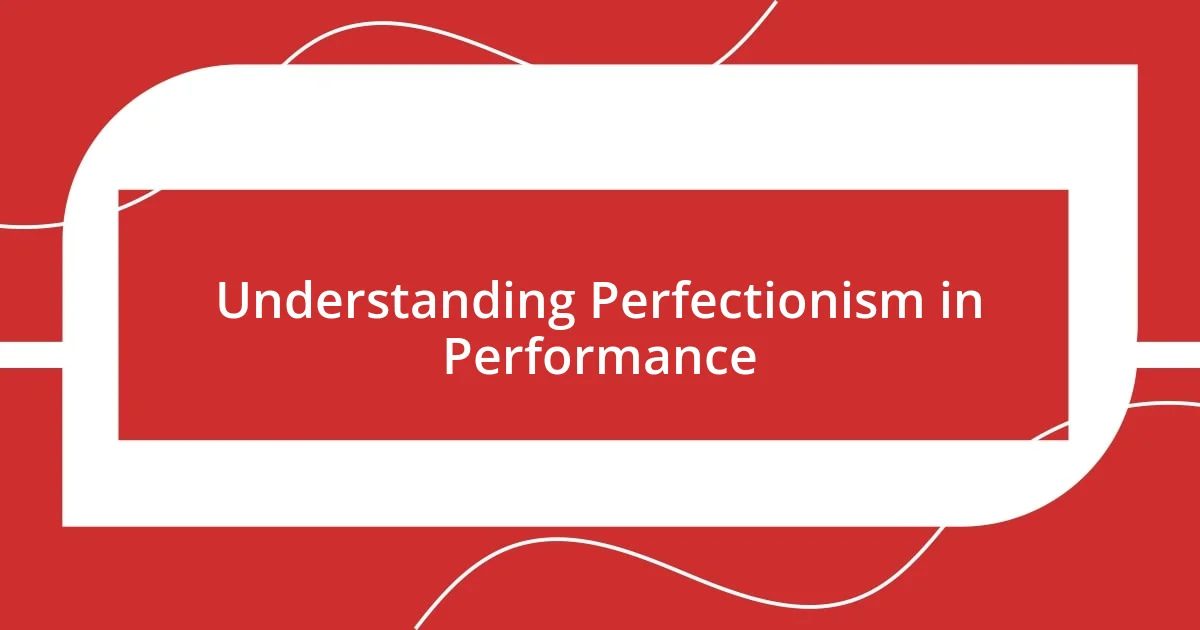
Understanding Perfectionism in Performance
Perfectionism in performance often stems from a deep-rooted fear of judgment or failure. I remember rehearsing for a presentation where I was so focused on getting every word right that I lost sight of the message I wanted to convey. Have you ever felt that overwhelming pressure to be flawless? It can be paralyzing.
This belief that only perfection is acceptable can lead to unnecessary stress and self-doubt. I know this firsthand; my tendency to overprepare often left me exhausted rather than excited for the challenge ahead. It’s a rollercoaster of emotions—anticipation, anxiety, and eventually that dreaded feeling of inadequacy that creeps in when we fall short of our impossibly high standards.
As I navigated through my journey, I realized that perfectionism had a seductive allure, convincing me that excellence meant never making mistakes. But wasn’t it in those very mistakes that I learned my most valuable lessons? Reflecting on past performances, I discovered that authenticity often resonates more deeply with an audience than a polished façade ever could.
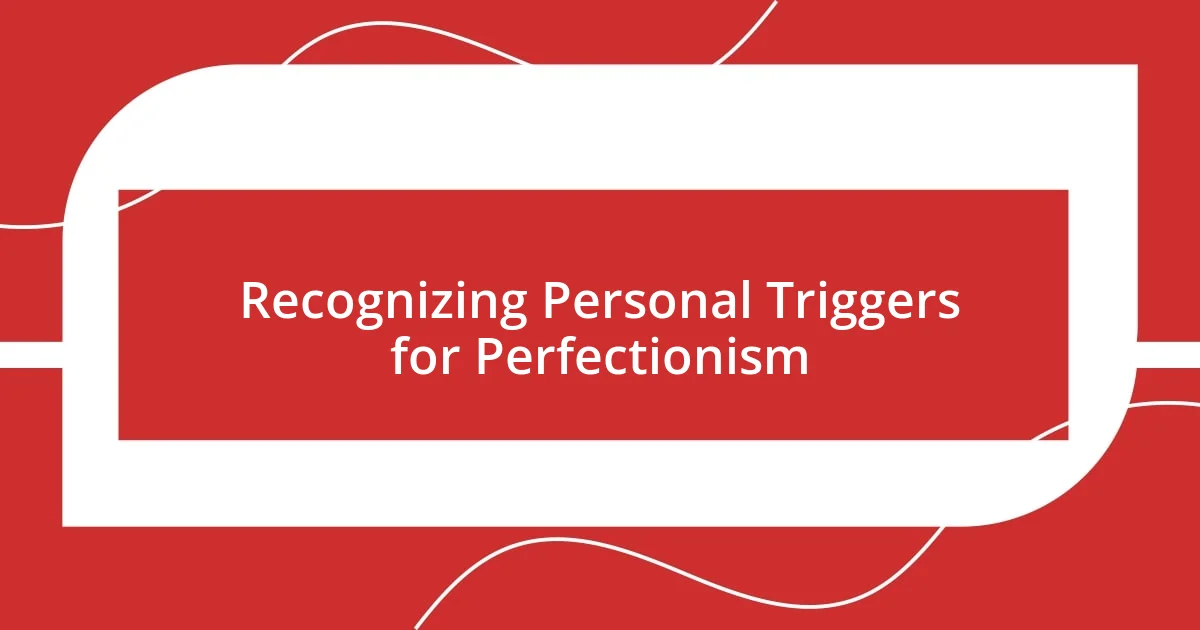
Recognizing Personal Triggers for Perfectionism
Recognizing what triggers my perfectionist tendencies was a game changer for me. One moment I distinctly remember was when I was preparing for an important performance. The stakes felt high, and I could feel that familiar pit in my stomach. I’ve since realized that certain environments, like high-pressure situations or critical feedback, would propel me back into that perfectionist mindset.
Here are some personal triggers I identified that might resonate with you:
- Over-commitment to projects: Taking on too much workload often led to heightened anxiety and perfectionist thoughts.
- Comparison to others: Scrolling through social media and seeing others’ seemingly flawless performances made me doubt my abilities.
- Fear of criticism: The worry of what people would say if I didn’t achieve perfection pushed me into a corner of self-doubt.
- High-stakes situations: Events like job interviews or presentations where I felt judged made my need for perfection intensify.
- Past failures: Remembering previous mistakes put pressure on me to ensure I never faced those feelings of failure again.
Once I acknowledged these triggers, I could confront them head-on and redefine what success meant to me.
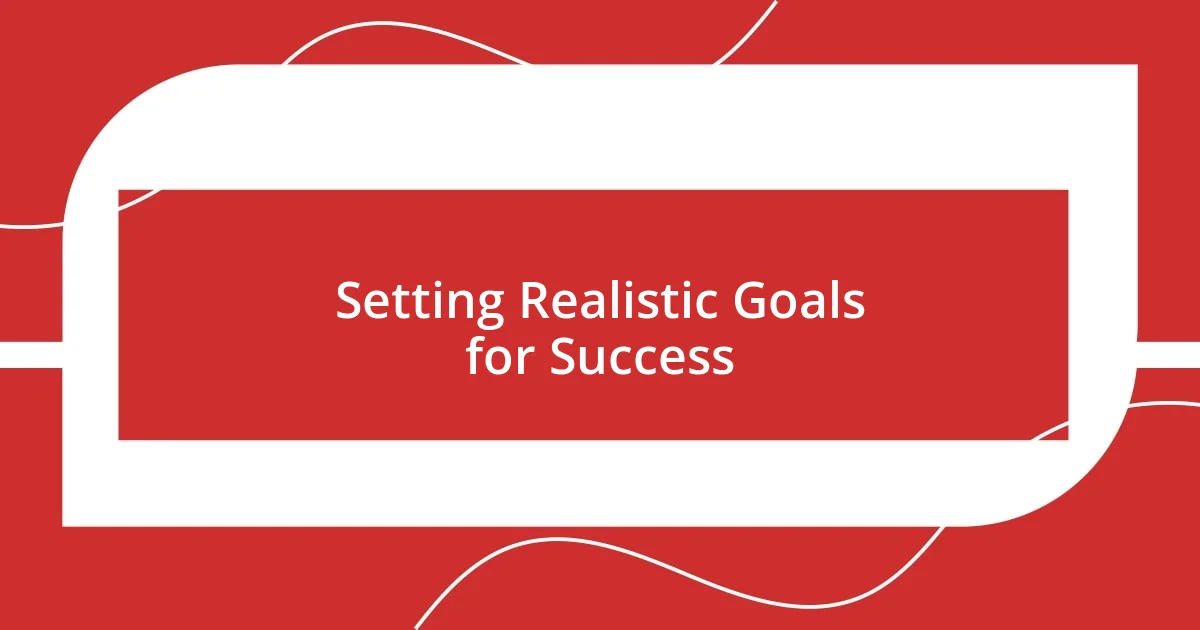
Setting Realistic Goals for Success
Setting realistic goals is crucial for curbing perfectionism and fostering genuine success. I’ve found that breaking larger tasks into smaller, achievable milestones alleviates the overwhelming pressure to excel. For instance, I remember preparing for a theater production; instead of obsessing over a flawless performance, I focused on mastering one scene at a time, which made the entire preparation feel more manageable and less intimidating.
Incorporating flexibility into my goal-setting has also made a significant difference. I learned to remind myself that it’s okay if things don’t go precisely according to plan. When I decided to approach a project with an open mind, I was pleasantly surprised by the creative solutions that emerged. It’s a gentle reminder that success isn’t solely defined by perfection but by progress and adaptability.
As I focused on setting realistic goals, I noticed how my anxiety melted away. By embracing the idea of doing my best rather than being perfect, I cultivated a healthier attitude toward performance. It became less about achieving an unreachable standard and more about celebrating incremental achievements, which, for me, transformed the experience into something enjoyable rather than nerve-wracking.
| Realistic Goal Setting | Perfectionism |
|---|---|
| Focus on progress | Focus on flawlessness |
| Embrace flexibility | Seek rigid structures |
| Encourage self-compassion | Create self-doubt |
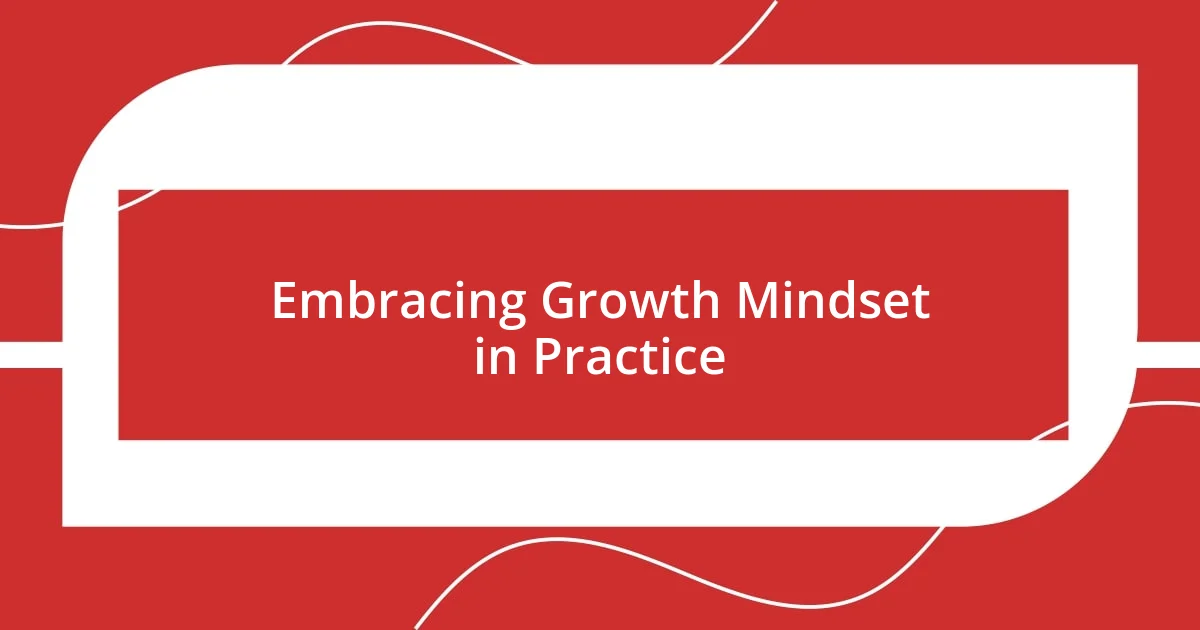
Embracing Growth Mindset in Practice
Embracing a growth mindset was transformative for me, especially when I faced the pressure to perform perfectly. I vividly remember a moment during a challenging presentation when I took a deep breath and shifted my focus from being flawless to viewing mistakes as stepping stones for improvement. This shift allowed me to embrace my vulnerabilities, reminding me that every stumble offered a lesson rather than a failure.
I also discovered the value of celebrating progress, no matter how small. There were days when I practiced for just fifteen minutes, and instead of feeling disappointed, I began to appreciate the effort I put in. I started asking myself, “What did I learn today?” This simple question became a powerful tool for reflection, helping me see that growth isn’t measured by perfection but by persistence and learning.
Another important realization came when I joined a supportive community of like-minded individuals. Sharing our struggles and celebrating each other’s progress helped me understand that everyone faces challenges. I remember discussing my fears openly with the group, and their encouragement reminded me that growth often emerges from discomfort. Isn’t it liberating to acknowledge that we’re all on this journey together and that imperfection is truly part of being human?
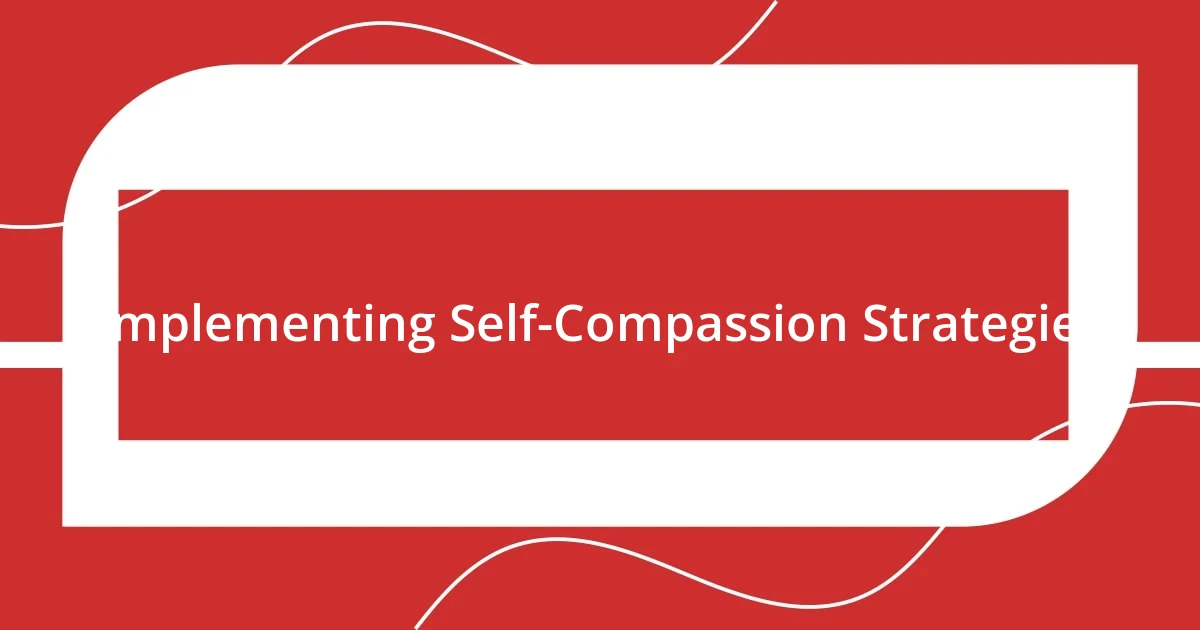
Implementing Self-Compassion Strategies
Implementing self-compassion strategies has been a game changer for me in overcoming perfectionism. One powerful technique I adopted was writing my own self-affirmations. Whenever I felt the urge to chastise myself for a perceived mistake, I would pause and remind myself, “It’s okay to be human.” This simple phrase helped to cultivate a kinder inner voice, allowing my feelings to surface without judgment.
Another strategy was to practice mindfulness during moments of self-doubt. I vividly recall a time when I was about to step onto the stage, my heart racing with anxiety. In that moment, I closed my eyes and took a few deep breaths, focusing on the sensations in my body rather than the thoughts swirling in my mind. This grounding exercise helped me acknowledge my feelings while gently redirecting my focus toward the present. It made me realize that being present often matters more than being perfect.
I also began to treat myself like I would a close friend. When I would slip up during a performance, I’d ask myself, “What would I say to someone I care about in this situation?” Surprisingly, it was much easier to be compassionate towards others than to myself. This shift in perspective helped me embrace my imperfections and see them as part of my unique journey, rather than as flaws. Isn’t it fascinating how often we are our own harshest critics?
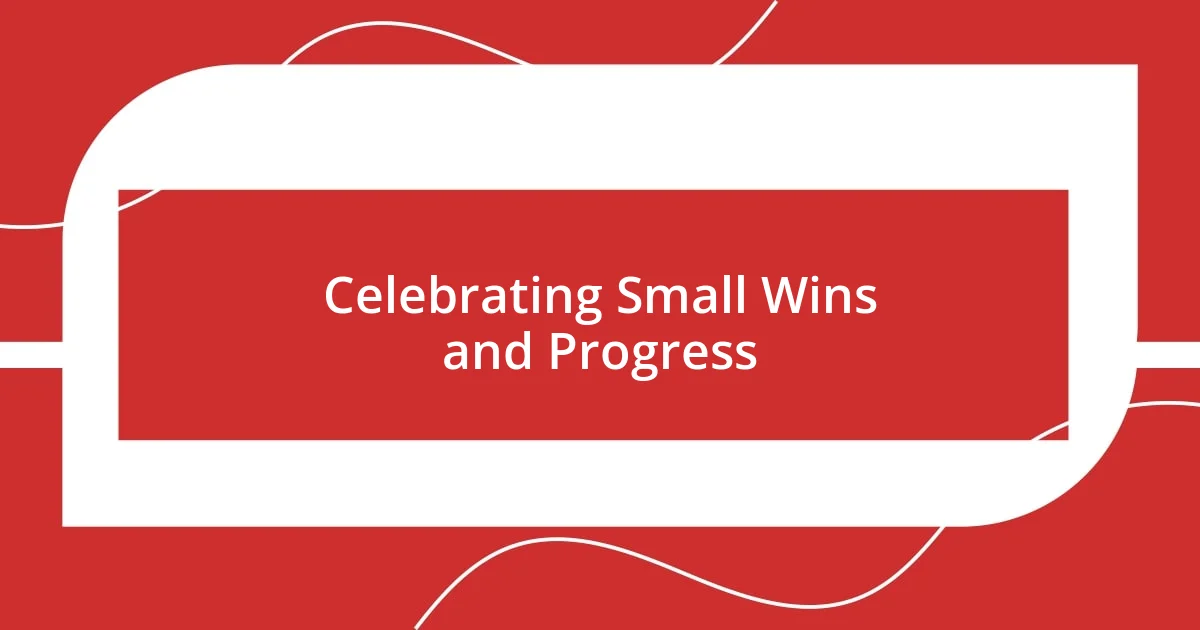
Celebrating Small Wins and Progress
Recognizing and celebrating even the smallest achievements was a revelation for me. I remember the first time I managed to deliver a full paragraph without stumbling over my words. Instead of brushing it off as just a part of the process, I treated it like a huge deal! I celebrated with a little dance in my living room, feeling a burst of joy that fueled my motivation to keep pushing forward. Isn’t it amazing how those tiny moments of victory can shift our perspective?
There were days when simply showing up, whether in practice or during a rehearsal, felt monumental. I used to think that if it wasn’t perfect, it didn’t count. But gradually, I learned to appreciate the effort I put in, knowing there was merit in just being present and trying my best. One day, after a particularly challenging session, I treated myself to my favorite dessert as a reward. That act of kindness highlighted the importance of recognizing progress rather than perfection.
Now, I make it a point to share these small wins with friends and family. I recall a moment when I shared my recent breakthrough with a close friend. Her genuine excitement about my progress truly uplifted my spirits. This shared celebration made me realize how powerful it is to vocalize our achievements. It reminds us that growth is a collective journey, and sometimes, all it takes is a little recognition to keep our momentum going. How often do we take time to acknowledge and cherish our own progress?










